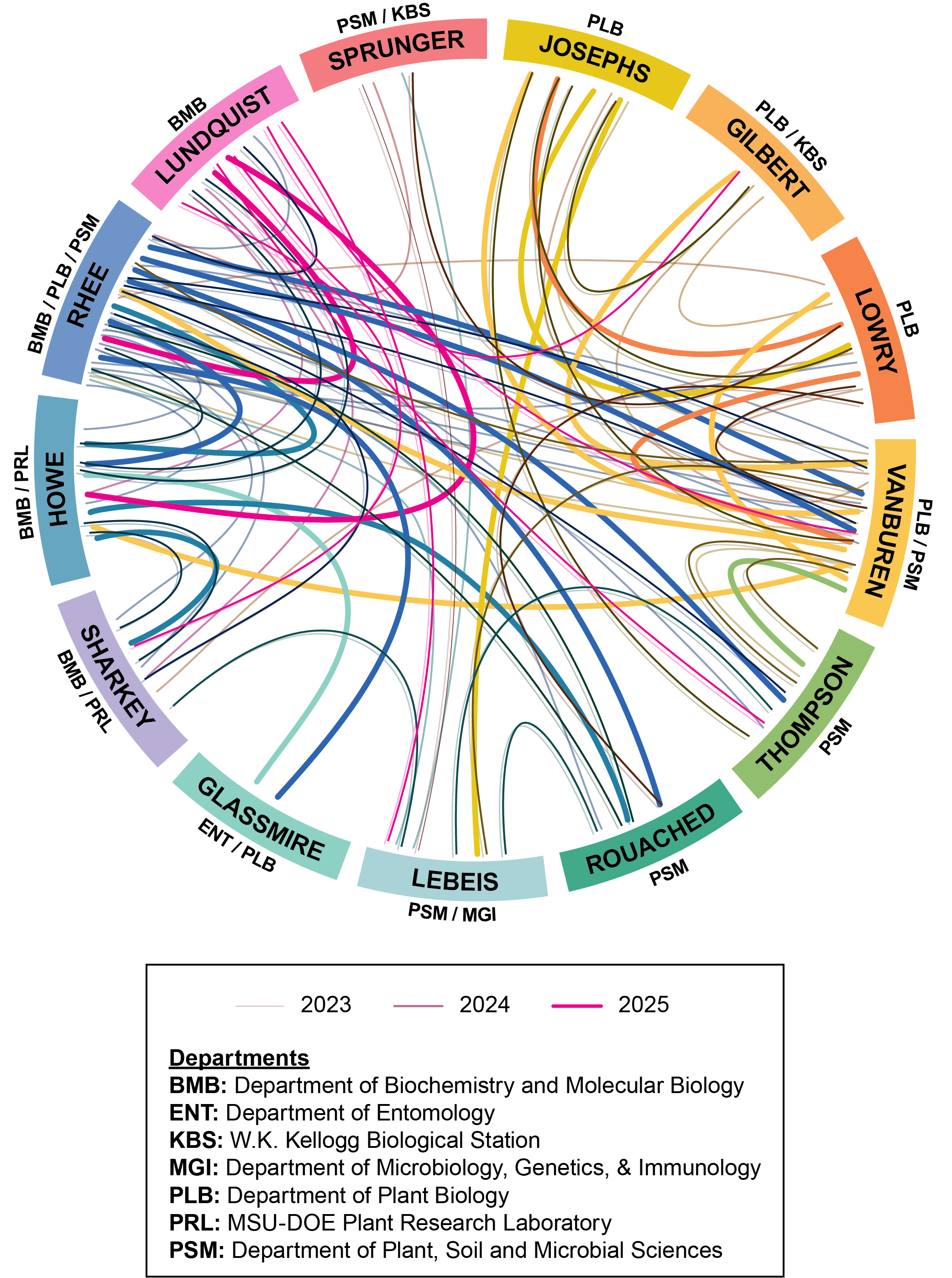Research
About Our Research
The Plant Resilience Institute (PRI) at Michigan State University (MSU) is a globally renowned laboratory and field research center for plant resilience.
As a Center of Excellence, we connect leading plant researchers and eminent interdisciplinary labs to address the challenges that climate change poses to food production and crop resilience. PRI is where future leaders of plant research are trained. These leaders will advance, advocate for, and prioritize the importance of plant resiliency in our society and the environment.
By focusing on convergent science, we provide the resources and platform for groundbreaking collaborations. PRI faculty come from colleges, departments, and institutions across MSU, including:
- College of Agriculture and Natural Resources
- College of Natural Science
- Department of Biochemistry and Molecular Biology (BMB)
- Department of Entomology (ENT)
- Department of Microbiology, Genetics, & Immunology (MGI)
- Department of Plant Biology (PLB)
- Department of Plant, Soil and Microbial Sciences (PSM)
- MSU-DOE Plant Research Laboratory (PRL)
- W.K. Kellogg Biological Station (KBS)

PRI focuses on collaborative science across labs, disciplines, and academic departments. Figure updated July 2025. Credit: Tanya Bakija, MSU Office of Research & Innovation
PRI excels in several synergistic areas of research related to plant resilience, extending from basic science to agricultural improvements. Our research integrates molecular, genetic, physiological, ecological, and computational approaches to understand the complex mechanisms of how plants respond to, resist, and tolerate environmental stresses. Emphasis is placed on mechanistic studies of stress tolerance, plant–microbe interactions, regulatory metabolites, and genotype × environment interactions. This research combines insights from both natural biological systems and crop species to inform agricultural improvement, environmental sustainability, and conservation goals. PRI also broadly uses non-model plant systems, allowing us to research critical biological questions that would not be possible to answer using a narrower range of study systems.
Through its innovative, bold, and transformative research, PRI is rapidly establishing itself as a hub for the global plant science community.
Center-Level Research Initiatives
PRI supports and contributes to several center-level research grants and institutes in the U.S. and across the globe, including:
Center for Sustainable Plant Innovation and Resilience through International Teamwork
The Center for Sustainable Plant Innovation and Resilience through International Teamwork,
or C-SPIRIT, is a Global Center supported by the NSF and its partner agencies with the mission
to discover bioactive compounds that enhance plant and soil health while engaging
industry partners and stakeholders to co-develop technology, promote sustainability,
and build public trust. C-SPIRIT establishes a collaborative framework across five
countries–U.S., U.K., Canada, Japan, Republic of Korea–to pool resources, expertise,
and technologies for solving agricultural challenges.
Great Lakes Bioenergy Research Center
The Great Lakes Bioenergy Research Center (GLBRC) is a DOE-funded Bioenergy Research Center led by the University of Wisconsin–Madison in collaboration with MSU and other partners to create biofuels and bioproducts that are economically viable and environmentally sustainable.
KBS Long-Term Agroecosystem Research
The W.K. Kellogg Biological Station (KBS) Long-Term Agroecosystem Research (LTAR) is part of the USDA's LTAR network, established to develop national, long-term strategies for sustainable agricultural production. KBS LTAR research informs the design of cropping systems that balance future productivity needs with enhanced environmental performance and benefits to farmers and society.
KBS Long-Term Ecological Research
The W.K. Kellogg Biological Station (KBS) Long-Term Ecological Research (LTER) is part of the NSF LTER Network to advance sustainable and resilient agricultural ecosystems through integration of long-term scientific research, education, and engagement with stakeholders.
Plant Cell Atlas
Plant Cell Atlas (PCA) is an NSF-funded grant to create a community resource that maps cellular and subcellular plant protein localization patterns, track the dynamic interactions between proteins, identify the molecular components of cellular substructures, discern complete states and transitions of specialized cell types, and integrate these disparate data points in order to generate testable models of cellular function. The PCA initiative includes plant science leaders from imaging, proteomics, genomics, nanotechnology, and data science from across the nation.
Plant Metabolic Network
Plant Metabolic Network (PMN) is an NSF and DOE grant that aims to bring together biochemical pathway databases and research communities focused on plant metabolism. At the center of the PMN is PlantCyc, a public reference database containing pathways and their catalytic enzymes, compounds, and genes from many plant species.
Water and Life Interface Institute
WALII, or the Water and Life Interface Institute, is an NSF grant that operates as a virtual research institute bringing together labs across the U.S. to study how life continues without water from the molecular level up to evolutionary levels. WALII members seek to understand the methods used to survive desiccation and rehydration and whether or not these strategies are similar for all organisms.
